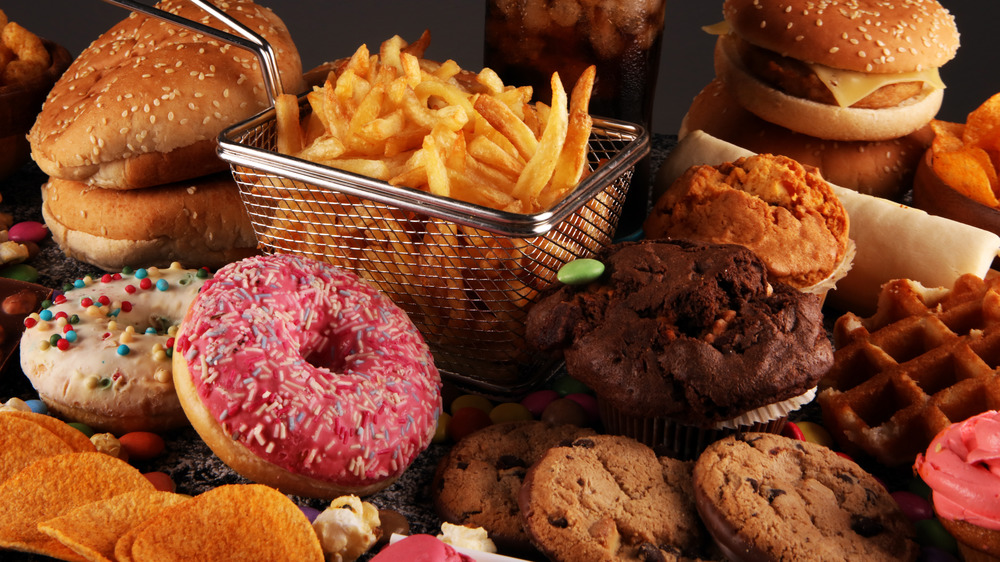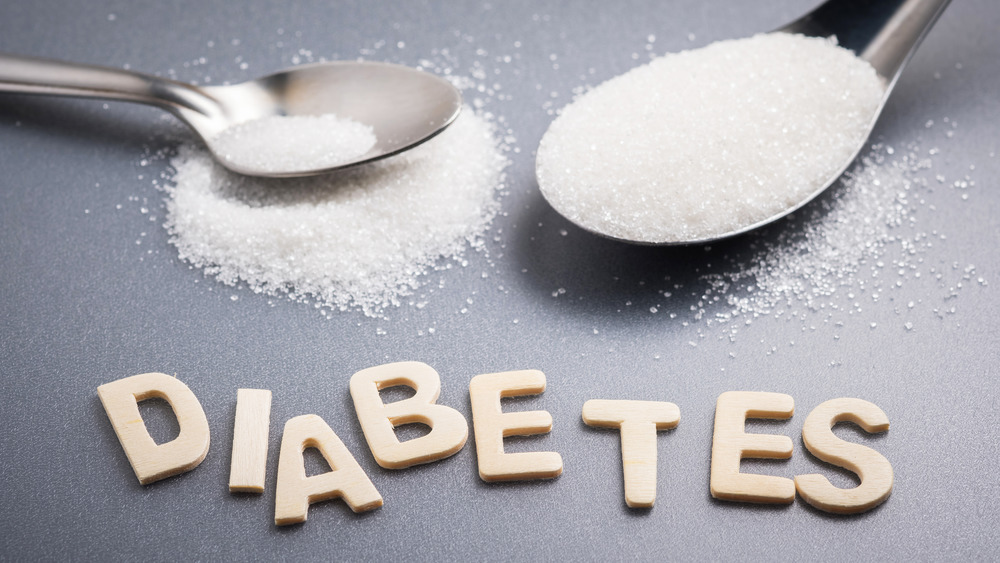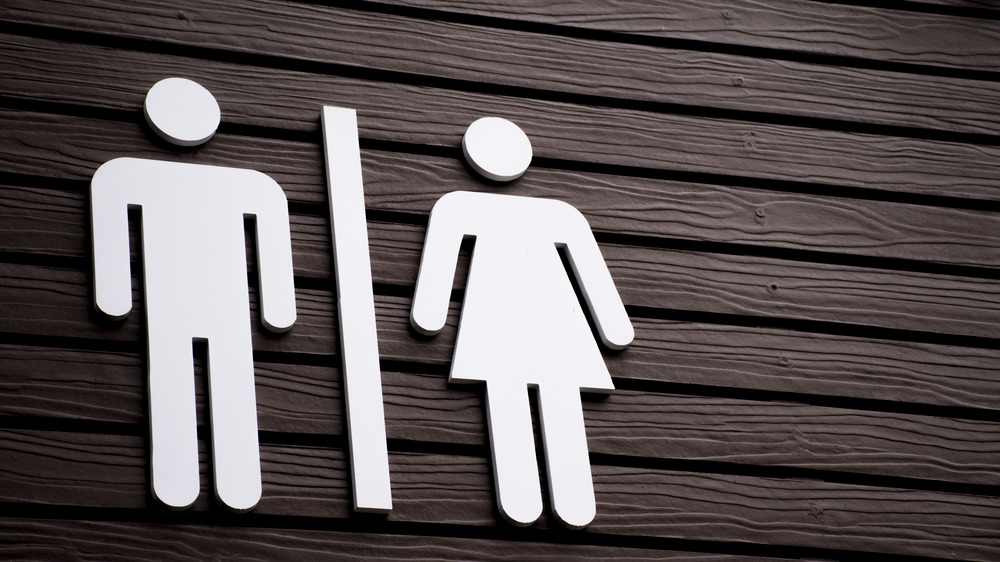When You Eat Lots Of Carbs Every Day, Here's What Happens To Your Body
What do fluffy pancakes, a hot slice of pizza, and that addictive bag of potato chips have in common? Well, for one thing, they're delicious! For another, you probably won't find any of them listed in a diet book because they're super-high in carbs. Have you ever daydreamed about what it would be like to eat these kinds of foods all the time? Or perhaps you actually know what it's like because that's how you eat, and you're curious what effect they might be having on your body?
It turns out that eating a ton of high-carb foods can cause a number of health issues. In an interview with Mashed, Amanda A. Kostro Miller, RD, LDN, who serves on the advisory board of Fitter Living, pointed out that the first and most obvious concern will be that number on the scale. (No surprise there.) "If you tend to overindulge on carbs, especially sweets, snack foods and sugar-sweetened beverages, you may see weight gain, or inability to lose weight like you want," Miller said. It's not the carbs' fault, though, she added. It's the total calories you're eating that affects your weight. There are health concerns linked specifically to the overconsumption of carbohydrates, though. And some of them are serious.
Your blood sugar levels may spike
According to Miller, one of the greatest concerns with a diet high in carbs that you'll be putting your blood sugar levels on an unhealthy rollercoaster. This is especially dangerous for people who are either suffering from diabetes or have been told by a doctor that their blood sugar is at pre-diabetic levels. "Poor control of carb intake can lead to blood sugar spikes throughout the day," Miller explained. "People with diabetes need to have individual or small group training with a registered dietitian or certified diabetes educator to understand their recommended carb intake."
Your best bet is to keep an eye on your macros, or the total breakdown of carbs, fats, and proteins you eat every day, Miller noted. About half of your calories – between 45 and 65 percent – should come from carbs, while 20 to 35 percent should come from fat, and 10 to 35 percent should come from protein.
You could end up spending a lot of time in the bathroom
A delicious, indulgent dessert might taste great in the moment, but if an hour or so later, you're miserable in the bathroom, perhaps that apple pie a la mode wasn't worth it. According to Miller, a number of people are sensitive to high "FODMAP" foods. This acronym stands for Fermentable, Oligosaccharides, Disaccharides, Monosaccharides, and Polyols – all nutrients you will find in foods that are high-carbohydrate, including healthy ones, like fruits and vegetables. "While most people don't need to discriminate against specific fruits and vegetables to be healthy, some people might notice that certain fruit/vegetables make them feel better or worse than others," she explained. "Even though all fruits/veggies are nutritious, some are high in FODMAPs and may cause some people distress like bloating, gas, diarrhea and abdominal pain."
Now, this is not your get-out-of-vegetables-free card. This issue with FODMAPs only affects some people, not all, and if you're not someone who feels "sick, heavy, and gassy" after a fruit salad, you should continue to eat all the fruits. "It is important to note that high FODMAP foods aren't 'unhealthy,'" Miller added. "High FODMAP foods that may be problematic are apple, mango, pear, watermelon cauliflower, green bell pepper, sweet corn, mushrooms, broccoli, cabbage, garlic and onion." These foods may cause bloating, flatulence, and belly pain in people who have intestinal conditions like IBS, she explained.
You may feel full of energy
Carbs sure get a bad rap, but the right carbs are actually very good for us, because they give us energy, Miller pointed out. "Carbs are the body's preferred energy source. Now, carbs won't replace a good night's sleep, but carbs are used to feed your cells and keep you going," she said. "Getting enough carbs fights off fatigue and gives you energy to live a healthier lifestyle full of activity and exercise. On the flip side, Miller noted, "not eating enough carbs can deplete lean body mass and body protein."
You might note that Miller is pushing a lot of fruits and veggies, not pizza, pancakes, or any other kinds of starches that are in your carb-binging daydreams. That's because there is a difference, she said. "Not ALL carbs are bad. Healthy carbs give you tons of nutrition, energy, fiber and micronutrients." Which foods are on the "nice" carbs list? You guessed it: fruits and vegetables. Miller also said we should eat healthy amounts of whole grains, legumes, and lean dairy. "These carbs give you long term energy," she explained. "Also, fruits and vegetables are carbohydrate foods and should be consumed daily for fiber, water, vitamins and minerals." Dairy such as nonfat or low-fat yogurt or milk, meanwhile, "can be part of a healthy weight loss diet due to their protein content," Miller explained.
You might feel like treating yourself
So what about the carbs that are definitely not in the category of vegetables or skim milk? "'Carbohydrates' is an umbrella term for several types of carbohydrates," Miller said. "When we break down carbohydrate foods, there are some carbohydrates that should be included in the diet at every meal and other types of carbs that should be limited or consumed as a treat." The carbs that are "no-so-healthy" carbs include candy, desserts, sodas, and processed snack foods. You don't have to banish them from your diet completely, Miller added, but they really should be saved for special occasions.
"There are carbohydrate sources that should be limited for general health and for weight loss, to control your calorie intake," Miller added. "These types of carbs have lots of calories and minimal nutrition, so you may hear them called 'empty calories.'" And if you have them as a rare pick-me-up, you'll be able to avoid the sugar spikes and weight gain that come from regularly indulging, while really getting the opportunity to savor every bite.




